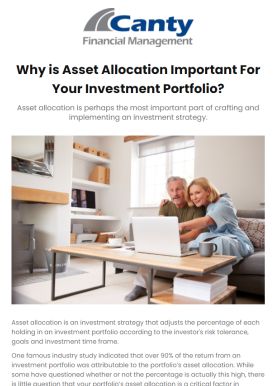
Retirement is often looked at as a milestone in our lives, and it is. While your investments likely will change in retirement, we are finding that this change is often a bit more gradual than we might have seen in the past for retirees. How you invest once you reach retirement will depend upon a number of factors.
Many people view retirement as a cliff moment, in other words everything in all aspects of their life experiences a drastic change. While retirement is a life event that does bring change, your investments generally should not undergo a major upheaval just because you are entering retirement.
For most of our clients, the changes in their investments are generally more gradual and occur over the years leading up to retirement and continue into retirement. An investor’s asset allocation should be adjusted over time to fit their time horizon for needing the money, their risk tolerance and a host of other variables.
Retirement today is evolving. It is not always the “cold turkey” quitting work at a specified age version of retirement that was common in previous generations. Between longer life expectancies and both the need and desire of some folks to continue to work, retirement looks different for many people today. The changing face of retirement can impact the role of their investments in their retirement income strategy for many retirees as well. This can and will have an impact on how many retirees invest during retirement.
In general, retirees want to reduce their investing risk to the extent that is possible and practical. For someone in the 60s and older, they just don’t have the time to recover from a market correction that an investor in their 30s would.
This attention to managing risk must be balanced against a retiree’s need for investment growth to help ensure that they don’t outlive their money during retirement. For most retirees this means a balanced asset allocation with a sufficient allocation to stocks to maintain their purchasing power over time.
While inflation is currently quite low, it won’t stay that way forever. Additionally, inflation is often higher for retirees in that many of their expenses seem to increase at a higher rate than the general level of inflation. Healthcare costs for retirees in general, and the costs of many prescription drugs specifically, are examples of costs that impact retirees and that are increasing faster than the general rate of inflation.
While your focus prior to retirement may have been more growth oriented, this focus may shift at least partially, to a more income-oriented approach in retirement. This might entail shifting at least a portion of your equity allocation to stocks that throw off dividend income. This might be via mutual funds or ETFs that hold dividend paying stocks, or through direct investments in selected individual stocks.
As our clients enter retirement, one of the key planning issues we work on with them is their retirement withdrawal strategy. This involves a strategy to decide which accounts to tap for retirement income and in which order.
This process is both involved and dynamic. There are a number of variables involved for the retiree including:
The retirement withdrawal strategy is important and is not a one-time effort. In some cases we’ve seen a client’s retirement withdrawal strategy change annually during the first few years of retirement. This could be due to changes in whether or not they are working or due to changes in their tax situation year-to-year.
These adjustments in their retirement withdrawal strategy will have an impact on their investments in several ways. First their allocation to cash or near-cash investments such as money market funds will likely increase. It’s generally a good idea if part of the retiree’s withdrawal strategy includes taking money from taxable investment accounts or retirement accounts to keep a certain amount in cash. This might be a year or two of liquid assets that will be available for distributions so as to avoid having to sell off equities during a drop in the stock market.
Do my investments need to change when I retire? As you can see from the discussion above, the answer is generally yes. But the level and types of changes will vary greatly from investor to investor. Some key drivers of your retirement investment strategy will include:
Like many aspects of your life in retirement, your investments will likely need to change. This change will generally be an evolutionary process versus a drastic change on day one of retirement.
We can help align your investments with your retirement and overall financial planning objectives. Give us a call to see how we can help you plan for a financially satisfying retirement.
Bill Canty, CFP®, CPA
Joe Canty, Investment Advisor
Ed Canty, CFP®, Investment Advisor
Maureen Walsh, EA, Investment Advisor
Tina Alteri, CPA, Tax Advisor

